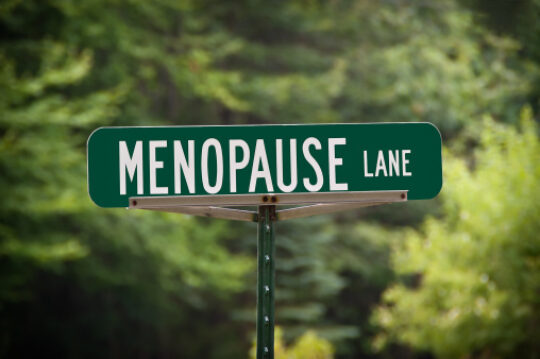Attention, Menopausal Women
The three most common causes of sexual dysfunction are treatable.

Menopause: The Good and the Bad
For some women, menopause is a time of liberation. No longer saddled with fear of getting pregnant, they find their desire increases, and they can be more spontaneous with their partner.
But for other women, menopause brings declining desire or uncomfortable intercourse—leaving them, as well as their spouses, sad and confused. But it doesn't have to be that way.
The most common causes of sexual dysfunction after menopause are treatable. Understanding the cause of your particular problem is the first step to restoring a satisfying sex life.
Knowing What's Not Normal for You
Every couple's sex life is different, and there is no such thing as “normal.” Nevertheless, changes in your sex life that cause unhappiness are not normal after menopause.
The signs and symptoms of sexual dysfunction are feelings that your sex life is not the way you want it to be, and it is causing you concern and distress.
The three most common causes:
- Hormonal changes
- Health issues
- Lack of desire
All three are treated in different ways.
Problem #1: Painful Intercourse
The most common symptom women notice at menopause is a decrease in vaginal lubrication, which can make intercourse painful. There are three approaches that can help:
- Lubricants
- Moisturizers
- Vaginal estrogen
Vaginal estrogen therapy is the only approved prescription drug therapy for this condition. It effectively restores the vaginal mucosa to a premenopausal state. A moisturizer used regularly a couple times a week (not at the time of intercourse) may be helpful.
Hypersensitivity at the entrance to the vagina is a common problem that does not necessarily improve with lubrication. If the dryness does not disappear easily, see your gynecologist.
Painful intercourse can also be caused by endometriosis, a pelvic mass, ovarian cysts, vaginitis, scar tissue from surgery or a sexually transmitted disease. So it's wise to have a checkup if you are experiencing painful intercourse.
Problem #2: Poor Health or Fitness
Many common medical conditions and medications can interfere with sexual performance and desire.
Studies have found that women ages 50 to 79 years have less sexual activity if they are overweight, or have poor-to-fair health, arthritis or a history of heart attack. The following risk factors can also cause sexual dysfunction:
- Diabetes
- High blood pressure
- Excessive alcohol use
- Stress
- Fatigue
Older women need to stay fit to maintain their sexual functionality. This means avoiding excess weight, controlling cholesterol, and preventing or managing diabetes.
For unavoidable problems, such as cancer, chemotherapy, arthritis or surgery, try being creative. Couples can consider alternate ways to be intimate and achieve orgasm, including massages, different kinds of lubricants and sexual toys.
High blood pressure medicine, antidepressants and chemotherapy are among the many medications that can cause sexual dysfunction. If you feel a medication may be responsible, ask your doctor if a substitute medication would work.
Problem #3: Lack of Desire
Emotional changes that often accompany menopause can cause a woman to lose interest in sex. However, that lack of desire is different from lack of sexual enjoyment.
Women without desire can still enjoy sex once they get into it. Try assessing what might be preventing you from being interested. Common factors are:
- Stress
- Fatigue
- Relationship issues
- Sexual boredom
Reading erotic material a couple times a week can increase a woman's interest in sex. While a gradual decline in testosterone levels can affect female libido, female testosterone levels do not always correlate with level of desire. Testosterone therapy for women can produce unwanted side effects if not closely monitored.
Viagra for Women?
And there is no Viagra® for women. Viagra is a medication that increases blood flow to the genitals, which improves penile erection. But studies of Viagra in women are not convincing. Viagra is not a treatment for low desire. Mental arousal and genital arousal are not the same thing. Women can feel mentally and emotionally aroused without genital arousal, so the two do not correlate well.
There are no approved medications for sexual desire. The best resource for arousal is your brain.
Being on very pleasant terms with your partner and thinking sexual thoughts are two components for becoming aroused. Make a mental list of what arouses you. If the cause of lack of enjoyment or desire is not apparent, you may want to see a sex therapist or marital therapist.
Discontinuation of sexual intercourse may lead to vaginal stenosis (shrinking/tightening) and the inability to have intercourse.
The human range of desire is very wide, and it’s rare to see a perfectly matched couple. Many couples have to compromise on sexual frequency and variety as they age. Some couples take advantage of slowing down to enjoy intimacy even more.
For more information on restoring your intimate relations during menopause, download our free Guide On Sexual Health During Menopause.
